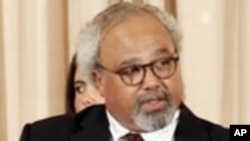The top U.S. official on HIV/AIDS says the Obama administration is committed to fighting the disease. However, Ambassador Eric Goosby says the economic crisis will be a factor in all funding decisions over the next few years.
<!-- IMAGE -->As the new U.S. Global AIDS Coordinator, Dr. Goosby oversees PEPFAR, the President's Emergency Plan for AIDS Relief. Created under President Bush, it began as a five-year, $15 billion program. In 2008, Congress reauthorized PEPFAR, approving up to $48 billion over the next five years. Besides PEPFAR, the amount would support the Global Fund to Fight AIDS, TB and Malaria.
But that was when the economy appeared healthy. Ambassador Goosby says expanding PEPFAR and other AIDS-related programs now must be carefully weighed.
"I think the problem has been the economic downturn brought us into, I think, a reality that continues to reverberate with budgetary discussion within the administration...and how it impacts the deficit. And those conversations have predominated in the thinking as we move into 2010, 2011 in budget discussions," he says.
The Obama administration's $6.6 billion pledge to fighting AIDS, TB and malaria in the new fiscal year is about $165 million higher than the current fiscal year. However, the proposed increase is lower than in some years past. Goosby says U.S. resolve is unchanged.
"The president and Secretary (of State) Clinton have been very clear about their commitment to PEPFAR. Indeed, my interest and willingness to leave everything I was engaged with and happy with to do this work was based on my belief in that commitment," he says.
Dr. Goosby had been head of the non-profit Pangaea Global AIDS Foundation and professor of clinical medicine at the University of California. He took part in national treatment programs in Rwanda, South Africa, China and Ukraine.
He says PEPFAR won't expand as fast as it did in the beginning.
"The trajectory for PEPFAR expansion in the first five years is not going to be reflected for the immediate future. But it does not reflect a change in commitment or emphasis," he says.
Is it possible?
<!-- IMAGE -->In 2005, at the G8 summit in Gleneagles, Scotland, leaders set a goal of near universal access to AIDS treatment for all those who need it by 2010.
Goosby says achieving that goal is difficult for a number of reasons, including the fact that thousands of people are newly infected every day.
"We continue to see new seroconversions happening. And we continue to see them happening in groups that are generally considered high risk and often unwilling to reveal…for fear of being stigmatized or discriminated against," he says.
Those high-risk groups include intravenous drug users and men having sex with men.
Then there's the issue of treatment. If everyone infected with HIV is put on anti-retrovirals even if their immune system has not crashed, it will take a lot more money and a lot more drugs. Currently, the people who are most sick are put on ARVs first. This is generally determined by the number of CD4 immune cells in the blood.
He says such decisions may need to be made on the country level.
"I
don't think that the ability to move everybody into care who needs to be in
care is going to be driven by setting a new trigger for…a CD4 count. It really is still being driven…by accessing
patients who are in need of treatment.
And unfortunately we are continuing to access these patients at a very
late stage of disease," he says.
A challenge to G8 leaders
<!-- IMAGE -->The International AIDS Society has released a new statement urging world leaders not to mistake recent progress against HIV/AIDS for "mission accomplished." The IAS is calling for "sustained political leadership and financing by the G8 and other donors to maintain recent momentum."
"I think that is a reasonable challenge for the International AIDS Society to call upon world leaders to continue to acknowledge…there indeed is a collective responsibility…by resource rich countries…around how resource rich countries relate to resource poor countries in helping to support their response to what is an overwhelming epidemic," he says.
The U.S. Global AIDS Coordinator says PEPFAR will continue to build on past successes. He says when the program started, only about 50,000 people in sub-Saharan Africa were on anti-retrovirals. He says, thanks to PEPFAR, that number is well over two million. More than one million others, he says, are being treated through Global Fund and other programs.
He says treatment programs have helped "stabilize people emotionally, psychologically and economically."




